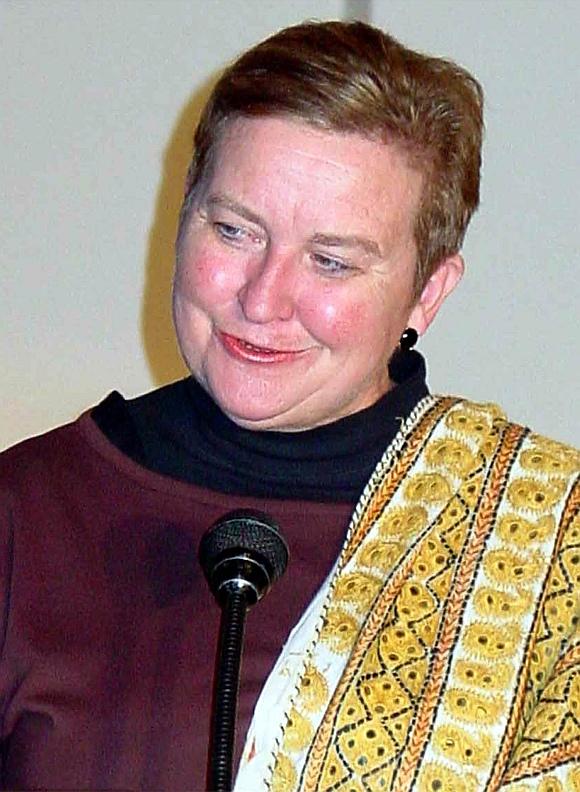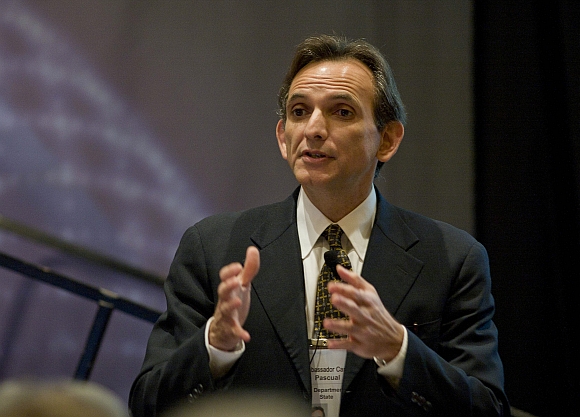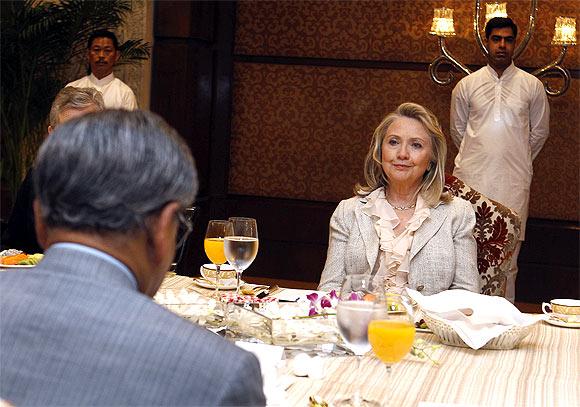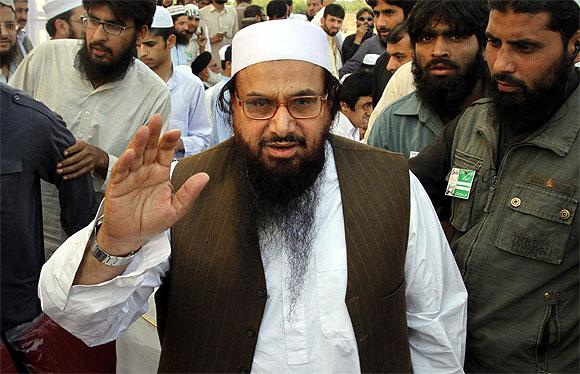
In her first interview to CNN-IBN's Suhasini Haider after taking over as the US Ambassador to India in April 2012, Nancy J Powell, compared India's 'lower'oil cuts unfavourably to Japan that has already received an American sanction waiver after it cut oil imports by a whopping 80 per cent in April. India has announced a 34 per cent cut so far.
Here is the transcript:
Ambassador Powell, this is your first Interview since you landed in India and you certainly had to hit the floor running with Secretary of state Hillary Clinton's visit here, so let me start with asking Was her mission here essentially for India to disengage its ties with Iran?
No, she came for a variety of reasons -- she wanted to have a chance to review the global issues with India but specially to prepare for the strategic dialogue that will occur between her counterpart SM Krishna in June in Washington and to make sure that all of us who are working on the issues that prepare for the strategic dialogue have the direction.
Will India get a waiver on sanctions?
As the secretary was quite explicit in saying that's a premature question at this point. Obviously, the decision will be made after reviewing all the facts and figures and taking a look at what is happening.
I would go back to say her focus was much broader than that particularly looking at the variety of trade types our corporation our approaches in United Nations. Looking at particularly American business and how it wants to enact in India, understanding some of the constraints some of the financial situations here that's all a very broader gender.
...

Even so, her energy adviser Carlos Pascual has been meeting with the Indian leadership on just how to try and cut down India's oil imports from Iran. He began with statements that are reportedly saying that he is not impressed by the India's efforts so far.
I felt really very bad because I was standing next to him when a reporter approached him and what he said to the reporter was, "I am not doing press today" and somehow I think that's been garbled into and got lost into translation.
But Ambassador Powell despite all that agreement India still faces financial sanctions from the U.S on subject of Iran. Now India has month on month cut its oil imports to 34 per cent, a 40 per cent year on year. Many are asking the question how much it will take before U.S is satisfied.
I don't want to refer to those statistics as although there is slightly little lower than that but with the legislation calls for it significant cut and we have seen other countries in Europe, that are making cuts that have been seen as significant.
think India faces a situation which it's making decisions for its own energy securities that not to us they are diversifying. The figures I saw in last Sunday's paper suggested that Iraq has now become the no 2 suppliers in the diversification and these are the kinds of thing the sanctions are designed to look for.
...

Would you say that the US has succeeded in a sense that they are bullying India because we have seen diplomatic pressures we have seen the cajoling as well, we have seen the alternate in energy supplies being offered but we have also seen this threat of sanctions...many now accusing the US really of bullying India to cut its relations with Iran?
I would respond to that in two ways, obviously I do not see this as bullying, I think overall the United States and India share a common objective, both of us see a weaponised nuclear state in Iran as being very destabilising for the region.
This legislation appears to have as a result of other countries sharing the feeling that other measures have not worked, supporting and looking through their own national interests like I would say India is doing, have sought to diversify to seek other ways to meet their energy needs.
We see Iran now coming to the negotiating table we don't know what exactly will happen at the negotiating table. But I think india is making its own traces, it has need to make sure its sources of energy securities are diverse & the markets right now particularly with Libya and Iran coming back on that there are alternatives also in Africa and America to some of them in Iranian oil.
Lets turn to the other big issue that sort of shadowed Clinton's visit here and that was the question of Lashkar-e-Tayiba founder Hafiz Saeed, how do you deal with a persistent Indian accusation that the US has not come clear on its opposition to groups that threaten India, like the way it has done for groups that threaten the US?
I think the rewards for justice programmes answer is that, by indicating that we are very serious about seeking information that can be provided to the Pakistani consolidate related to arrest and imprisonment.
Secretary Clinton is very specific in saying that we are working for these groups to seize their activities, to support the efforts of others in Pakistan and in India who are working for ways to improve ties between the two countries and these groups are doing exactly the opposite of that.
...

So you are saying that the Rewards for Justice Program against Saeed should really prove US intent on the subject?
I don't think we are attempting to convince the US with the rewards for justice, we are looking for information that will work in a Pakistani court and then will be both acceptable within its legal system and effective that the information your own government has met with Pakistani investigators and others, we have provided information and we do hope that this is yet one more way that will result in the arrest and then a trial according the laws of Pakistan.
Also the nuclear business -- do you feel disappointed that the US did the heavy lifting in terms of the nuclear deal, yet the first nuclear power to be up and running is the Russian one...
It also predates I think the US negotiations but clearly US saw as part of the civil nuclear deal that we will have commercial opportunities in India.
We understood those were going to take a while to come...the very real concerns among our companies that want to build plants here about the liability laws, the efforts to understand how Indian law works, how the Indian official works to understand the national standards and our companies would be looking for and again there is a dialogue and we would like to make it move fast and with the dialogue goes on we are hoping there will be some progress and some steps can be taken by at least one of our companies yet this year.
There is an Obama's campaign targetting outsourcing jobs to India - that causes concerns in India. There's also the cut on L1 visas. Should India about worried on losing more jobs?
I think as secretary Clinton was very specific in saying last week that the campaign was about everything and anything. President Obama said it is the most defining relationship/partnership of the 21st century. We will look at India and the world at a global stage.
As you landed in India, Shah Rukh Khan landed in the US and faced questioning from the homeland security officials there is a lot of anger in India...The embassy apologised immediately but it seems that has become a pattern. Are US laws going to change to help this situation?
We are working very hard to make sure it changes and each time we have learnt something new and the number of incidents has gone down. We have an unfortunate incident and we are intensely sorry about that. We will make sure this does not happen again.
...